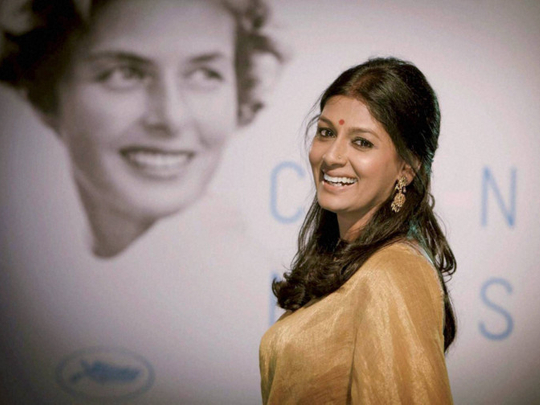
Actor and director Nandita Das visited the Cannes Film Festival to look for producers and financiers for her upcoming film on famous Urdu short story writer Saadat Hasan Manto.
The actress has previously attended the festival as a two-time festival jury member, but this time her trip had a purpose.
Known for her roles in films such as Fire, Earth and Bawander, Das says she got to watch only two films at the festival this time.
“But then I had gone there for a purpose and wanted to focus on just that. This time I had to find producers and financiers for my upcoming film on Manto and answer questions that were not always about the creative aspects of the project. After all, pitching for a film was a completely new terrain for me,” Das said.
Cannes, she said, is always a mixed bag of glamour and a space where all kinds of films find their place.
“Here directors are truly celebrated and often the standing ovation and applause they get can go on till your hands hurt. Sadly back home, much of the press is about who wore what, while there is lot else that is far more significant that happens.”
According to her, Manto believed in connections of the mind and heart and didn’t give much importance to national identities and boundaries.
“So an international film with many different collaborators is totally in the spirit of Manto. In fact, that is the reason why I want even a Pakistani producer to come on board.
“They [Pakistan] claim Manto to be their greatest short story writer and we claim he is one of India’s best. If we divide Manto like this, it will be against his spirit and therefore I want a shared sense of ownership, if at all one can own him”, she said.
Das first read Manto in English when she was in college and then a few years later she bought his Urdu collection Dastavez in Devanagari and was struck by his simple yet profound narratives and his insightful capturing of people, politics and the times he lived in.
“While undoubtedly many of his [Manto’s] writings could lend themselves to a dramatic film, it is the story of his own life that is supremely worth telling,” she said.
Das said she has been nurturing the idea of making a film about Manto for more than 10 years. But she felt overwhelmed by the large canvas — a period film set in Mumbai, Delhi and Lahore and the writer’s work exploring the big events of his time such as the Second World War, end of colonial rule and the partition of India and Pakistan.
She said while she felt unsure of her depth and range of experience to portray a man like Manto, today she feels better equipped, both emotionally and creatively.
She researched the life of Manto, who authored 600 short stories and 100 radio plays before his untimely death at the age of 42, over the last year. She has also met his three daughters in Pakistan, who shared details about his life.
Das, daughter of famed painter Jatin Das, says Manto seemed familiar to her as she felt she was reading about her father.
“Baba is an artist who is engaged beyond art, a maverick who is intuitively unconventional, a misfit who is often misunderstood. Even his bluntness isn’t too different from Manto,” she said.
The similarity, she says, extends even to their unusual sensitivity and their lack of a relationship to money.
On her work, the actor-director says her plate is “over-full” with work on the Manto script, besides rehearsals for the cineplay of Vijay Tendulkar’s Khamosh, Adalat Jari Hai, working with an Australian producer to write and direct a film about an Indian woman’s journey of self-discovery through her interactions with the aborigines of Australia.
Mother of five-year-old son Vihaan, Das also writes a monthly column and does advocacy work for issues close to her heart.













